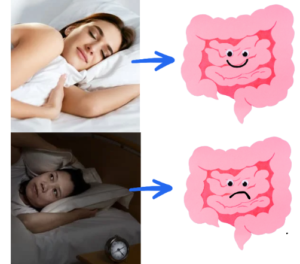Exploring the Vital Connection Between Quality Sleep and Optimal Digestive Health
Sleep is not merely a time for rest; it is essential for enhancing our overall digestion and gut health. This complex relationship may not be readily apparent, yet it encompasses numerous physiological mechanisms that function synergistically. The body’s circadian rhythm, often known as the internal biological clock, skillfully aligns our sleep patterns with our digestive processes. Many individuals observe that they experience feelings of hunger at similar intervals each day, illustrating the body’s remarkable ability to maintain equilibrium with natural biological cycles.
Unlocking the Benefits of Restorative Sleep for Improved Digestive Function 
Quality sleep is fundamental to the body’s capacity to heal, rejuvenate, and restore various systems, particularly the digestive system. The deeper stages of sleep are especially critical for these restorative activities. During these profound sleep cycles, the organs, tissues, and cells that make up the digestive system not only undergo relaxation but also partake in essential repair processes. The body prioritises cellular repair and growth during these deep sleep stages, which is crucial for regenerating the cells that line the digestive tract. These cells constantly face wear and tear from food particles and digestive enzymes. This cellular regeneration is vital for maintaining the integrity of the gastrointestinal lining, which subsequently enhances the efficiency of digestion.
Deep sleep also significantly contributes to bolstering the immune system, which is particularly crucial for the digestive system due to the presence of specialised immune cells activated by beneficial bacteria residing in the gut. These immune cells play an essential role in defending the gut and the entire digestive system against harmful microorganisms. This defence mechanism ensures a balanced population of bacteria within the gut environment. A strong immune response is vital for protecting against infections and maintaining overall gut health—two critical components for effective digestion.
Moreover, the organs that constitute the digestive system play a key role in detoxification, facilitating the expulsion of waste and harmful substances from the body. Deep sleep enhances this detoxification process by boosting the operational efficiency of the liver and kidneys, which are vital organs for toxin removal. This synergistic interaction between sleep and detoxification significantly contributes to overall digestive health and well-being, emphasising the importance of prioritising restorative sleep for a healthy body.
Examining Gut Motility and Its Connection to Sleep Quality
A fundamental aspect of digestion involves the effective movement of food and waste through the <a href="https://limitsofstrategy.com/the-impact-of-sleep-on-your-digestive-system/">digestive tract</a>, a process known as gut motility. This process experiences significant changes during sleep. Both during deep and light sleep, the rate of gut motility decreases markedly. This reduction is a necessary adjustment that allows the digestive system to conserve energy, which is then redirected toward repairing and regenerating digestive tissues. By conserving energy while asleep, the digestive process can operate more efficiently upon waking, thereby optimising nutrient absorption and waste elimination.
The migrating motor complex is crucial for the cycle of contractions that occurs during fasting periods, including sleep. This cycle is vital for gut motility as it effectively clears away food particles and residues that may linger in the digestive system. This natural cleansing mechanism of the digestive tract minimises the risk of bacterial overgrowth, thereby fostering a healthy gut environment. Importantly, the migrating motor complex is most active during the night when individuals are fasting and asleep, highlighting the essential role of sleep in safeguarding the health of the digestive system.
As dawn approaches, gut motility gradually increases, preparing the digestive system to efficiently process and digest food. This rise in motility can also trigger the first bowel movement of the day, exemplifying the finely tuned relationship between sleep and gut motility. Understanding this connection is vital for optimising digestive health and enhancing overall well-being.
Exploring Hormonal Interactions That Influence Sleep and Digestive Health
Ghrelin, often referred to as the hunger hormone, is instrumental in stimulating appetite. Conversely, leptin signals the brain when the stomach is full, helping to prevent overeating. Together, these hormones are vital for appetite regulation, yet their functions can be disrupted when sleep is insufficient.
Even one night of inadequate sleep can lead to elevated levels of ghrelin, resulting in increased appetite and often sparking cravings for carbohydrates. This situation, commonly described as feeling ‘hangry’, can be intensified by a drop in leptin levels following insufficient sleep, which disrupts the signals indicating satiety. This creates a challenging scenario where individuals may overindulge and make unhealthy food choices, struggling to recognise their body’s signals to stop eating. While occasional poor sleep might not lead to severe consequences, chronic insomnia can result in significant digestive issues, including inflammation in the gut, liver disorders, gastroesophageal reflux disease, inflammatory bowel disease, and even colorectal cancer, alongside contributing to weight gain.
Assessing the Effects of Sleep Disruption on Digestive Health
Disruptions in sleep can lead to a variety of digestive issues. Factors such as shift work, particularly night shifts, and experiencing jet lag can significantly disrupt sleep patterns, throwing the body’s internal clock off balance. Moreover, consuming food late at night or having irregular meal times can adversely affect sleep quality. The circadian rhythm, which governs sleep, is intricately connected to natural sunlight, which is essential for sustaining a healthy sleep-wake cycle.
Unfortunately, in today’s technology-driven society, many individuals spend the majority of their daytime indoors, which leads to a reduction in exposure to natural light. This shift has resulted in increased exposure to blue light emitted by devices such as laptops, televisions, and smartphones, further complicating the sleep cycle and overall sleep patterns, particularly when this exposure occurs shortly before bedtime.
The cumulative effects of these factors can lead to serious digestive issues, including diarrhea, ulcers, inflammatory bowel disease, or disturbances in the delicate balance between beneficial and harmful bacteria in the gut. This imbalance can also damage the gut lining, exacerbating existing challenges concerning digestive health.
Promoting Microbiome Health Through Quality Sleep
Microbiome refers to the trillions of microorganisms residing in the gut, predominantly comprising beneficial bacteria known as probiotics, along with viruses, fungi, and potentially harmful bacteria. These microbial communities are not only vital for overall health but also essential for digestive health. They enhance the immune response and assist in digestion, facilitating the production of specific vitamins, enzymes, hormones, and amino acids. Recent studies have established a significant link between the microbiome and sleep, suggesting that disrupted sleep or chronic insomnia adversely impacts the balance of these microbes, ultimately affecting both digestive health and overall well-being.
Investigating the Complex Interactions Between Microbiome Health and Quality Sleep
The relationship between sleep and microbiome health is intricate and multifaceted. Poor sleep can negatively impact microbiome health, while an imbalanced microbiome can also detrimentally influence sleep quality. To further comprehend this complex relationship, one study revealed a correlation between a higher abundance of certain bacterial types in the gut and quicker sleep onset, alongside fewer nighttime awakenings. While this article does not cover all findings, the key takeaway is that fostering a diverse and abundant population of beneficial bacteria in the gut is essential for achieving optimal sleep, efficient digestion, and maintaining overall health.
Exploring the Interconnections Between Stress, Sleep, and Digestive Health
A common consequence of stress and anxiety is disrupted sleep. Conversely, these mental health challenges can also negatively affect the physical health and functionality of the digestive system. This disruption can lead to altered gut motility and contribute to problems such as indigestion, ulcers, and irritable bowel syndrome. A critical factor in this dynamic is the role of the so-called stress hormone, cortisol.
Understanding How Cortisol Influences Digestive Processes
When cortisol levels rise, the body enters a fight-or-flight state. This physiological reaction redirects blood flow to essential areas such as the heart, brain, lungs, and muscles, while diverting it away from the digestive system. This response prepares the individual to either confront danger or flee, a reaction that was crucial for survival in ancient times.
In contemporary life, however, stressors are often less life-threatening, such as financial pressures, work-related stress, or inadequate sleep. While short-term redirection of blood flow may be beneficial in acute situations, chronic stress can severely impact the digestive system, particularly regarding gut motility. This can manifest as symptoms including constipation, diarrhea, indigestion, gas, and bloating. Therefore, implementing effective stress management strategies is essential for supporting both gut health and achieving quality sleep.
Ensuring adequate sleep is critical for maintaining a healthy digestive system, as the connection between sleep and digestion is inherently intertwined. Prioritising effective sleep hygiene practices is essential for attaining restorative sleep. This includes minimising exposure to blue light from electronic devices, adhering to a consistent sleep schedule, creating a cool and dark sleep environment, avoiding food intake within two hours prior to bedtime, and ensuring ample exposure to natural light throughout the day, especially in the morning.
References
Understanding Digestive Health and Circadian Rhythms
Exploring Sleep Dysfunction and Digestive Conditions
Examining the Link Between the Gut Microbiome and Sleep
Investigating Stress and Its Effects on the Digestive System
The Article: How Sleep Affects Your Digestive System appeared first on https://janestevensnutrition.com
The Article: Sleep’s Impact on Your Digestive System Explained appeared first on https://janestevens.net
The Article Sleep’s Impact on Digestive Health Explained Was Found On https://limitsofstrategy.com



